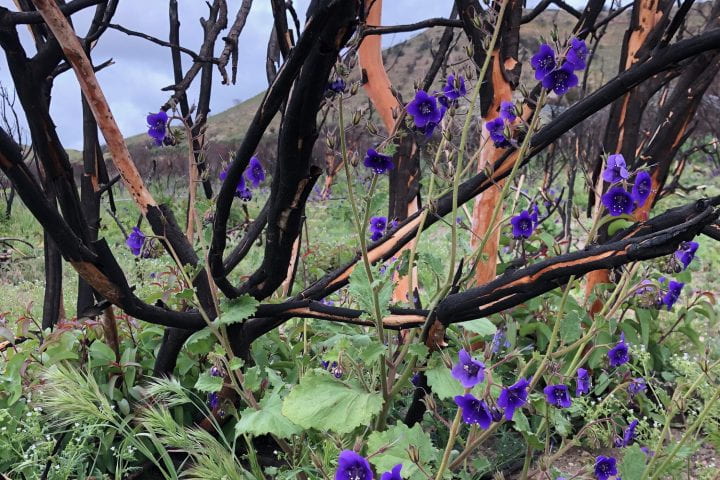Study finds drought fuels invasive species after wildfires
UCI biologists highlight critical link between drought, wildfires and coastal ecosystem transformations

Irvine, Calif., Feb. 28, 2024 — In a study recently published in the journal Ecology, University of California, Irvine scientists uncover the intricate dance between drought, wildfires and invasive species in Southern California’s coastal sage scrub ecosystems.
Titled “Long-term drought promotes invasive species by reducing wildfire severity,” the research, led by Sarah Kimball, Ph.D., director of the Center for Environmental Biology at UCI, sheds light on the critical interplay of these factors and its profound implications for ecosystem health.
The research, conducted at the Loma Ridge Global Change Experiment, showcases how prolonged drought acts as a catalyst, influencing not only the severity of wildfires but also paving the way for invasive species to take center stage. By simulating drought conditions, the study clarifies connections between climate change, wildfire dynamics, and shifts in plant communities.
Reduced fire severity associated with drought creates an environment conducive to invasive species. Non-native grasses, in particular, thrive in these conditions, potentially leading to a transformation of the landscape and abundance and diversity of native species.
The findings carry significant implications for managing these vulnerable ecosystems. The study advocates for strategies that carefully consider the frequency of wildfires and the control of invasive species post-fire. Controlled burns, commonly used in other ecosystems, are not recommended for coastal sage scrub systems, as they can inadvertently promote invasive species.
Kimball, the paper’s corresponding author, emphasizes the importance of experimental work in unraveling the dynamics between drought, wildfires and invasive species. “This study is unique in that replicate experimental plots were subjected to several years of different precipitation regimes prior to the wildfire, allowing an opportunity to test how a range of pre-fire weather conditions influenced fire severity and resulting plant community composition,” she said.
Kimball adds: “We found feedbacks between invasive species and low-severity wildfire, indicating that control burns should not be conducted in this system.”
Beyond academic circles, the research holds significance for the public. As wildfires increasingly impact communities, comprehending the factors influencing their severity becomes paramount. The study prompts a reevaluation of traditional wildfire management approaches, highlighting the urgent need to address climate change for the preservation of natural ecosystems.
The Nature Conservancy; the U.S. Department of Energy, Office of Science, Biological and Environmental Research, grant/award number DE-SC0020382; and the Natural Communities Coalition supported the research.
About UCI’s Brilliant Future campaign: Publicly launched on Oct. 4, 2019, the Brilliant Future campaign aims to raise awareness and support for UCI. By engaging 75,000 alumni and garnering $2 billion in philanthropic investment, UCI seeks to reach new heights of excellence in student success, health and wellness, research and more. The School of Biological Sciences plays a vital role in the success of the campaign. Learn more by visiting https://brilliantfuture.uci.edu/school-of-biological-sciences/.
About the University of California, Irvine: Founded in 1965, UCI is a member of the prestigious Association of American Universities and is ranked among the nation’s top 10 public universities by U.S. News & World Report. The campus has produced five Nobel laureates and is known for its academic achievement, premier research, innovation and anteater mascot. Led by Chancellor Howard Gillman, UCI has more than 36,000 students and offers 224 degree programs. It’s located in one of the world’s safest and most economically vibrant communities and is Orange County’s largest employer, contributing $7 billion annually to the local economy and $8 billion statewide. For more on UCI, visit www.uci.edu.
Media access: Radio programs/stations may, for a fee, use an on-campus ISDN line to interview UCI faculty and experts, subject to availability and university approval. For more UCI news, visit news.uci.edu. Additional resources for journalists may be found at communications.uci.edu/for-journalists.